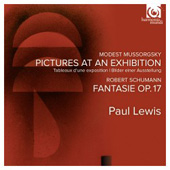

After years of learning, mastering and perfecting the piano works of Schubert and Beethoven, and releasing very highly recommended recordings of both composers (reviewed
here and here), I expected that pianist Paul Lewis would continue travelling down the same
familiar road and stop in to visit Brahms or Mendelssohn. I never suspected that he would suddenly turn left and head down a deserted dirt road and drop in on Mussorgsky. But what a pleasant
diversion and change of scenery this unscheduled stop turns out to be.
I believe it is fair to assume that most people have heard the 1874 Pictures at an Exhibition by Modest Mussorgsky (1839-1881) in its
orchestral version rather than in its original concept and form for piano. But it's the solo piano version that best reflects the composer's creative imagination. This work by Mussorgsky represents a visitor to an art gallery wandering from painting to painting, and the subtle influence
each of the paintings has on his mood through their portrayal of Russian history and life. The Promenade episodes in particular, which act as interludes between
each painting and well convey the shift in the observer's mood from picture to picture, see their changing character very well defined here by Paul Lewis. Following along with
an authentic edition of the score in hand while listening, I immediately noticed how faithful to the composer's indications and markings Lewis remains from start to finish. His attention to subtle
details, as in the Con Mortuis in Lingua Mortua (with the dead in a dead language), the 'Promenade' that follows the painting of the Catacombs, certainly helps
bring out the intended frame of mind brought on by the image of one's mortality. His Gnomus is twitchy and quick, Bydlo
is heavy and labored as intended, and actually begins fortissimo as marked. And the Great Gate of Kiev is grand and monumental - not in the physical sense
like the piano-destroying legendary recording by Sviatoslav Richter - but in the spiritual sense of a grand vision of one's motherland. This CD also includes a recording of Robert Schumann's
Fantasie Op. 17.
Now if only more musicians and record labels drove down side roads once in a while instead of always sticking to the tried and true, the music industry might just be the better for it.
Jean-Yves Duperron - January 2015